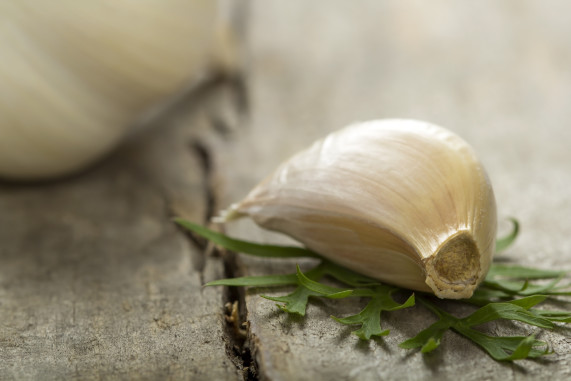
Garlic: The Wonderfully Stinky Healer
By Sebrina Zerkus Smith | 0 Comments | Posted 03/08/2016
In spite of the often breath-scorching results of eating of garlic, it has been prized for over 7,000 years for its intense flavor and aroma. Possibly even because of the stink, this member of the onion family –a close relative of the leek and shallot, can be found in products ranging from ice cream to dry rubs. The versatility of this plant is deliciously endless.
But did you know that garlic is also one of the oldest known medicinal plants, credited with fighting heart disease, lowering blood pressure and helping to fight off colds? If garlic had been created in a laboratory instead of by nature, it would probably be a very high-priced prescription drug, indeed.
Until relatively recently, the benefits of garlic were considered little more than folklore. But according to a recently published report in JAMA (Journal of the American Medical Association) the therapeutic properties of garlic have been described in more than 1,000 scientific studies.
Most of the research on garlic has concentrated on its ability to lower cholesterol and blood pressure as well as offering protection against strokes and heart disease.
But garlic has many wonderful medicinal properties. Read on to find out a few.
Garlic protects the liver from toxic substances. Garlic activates the cells of the liver protecting it from toxic substances; it also rejuvenates a tired liver and promotes its normal functioning.
Garlic improves blood circulation. When allicin, the major biologically active component of garlic, is heated during the cooking process, a substance called Ajoene is formed. This substance has a suppressive effect on thrombi and blood cholesterol, so it is effective for the treatment of atherosclerosis and thrombosis.
Garlic is good for your digestion. Garlic regulates stomach function. Allicin promotes the secretion of gastric juices by stimulating the mucous membranes of the stomach. Furthermore, it combines with proteins which can reduce excessive activity of the stomach. Allicin also regulates the functioning of the stomach by activating the large intestine, and giving relief from both constipation and diarrhea.
Garlic promotes insulin secretion. Allicin combines with vitamin B1 (thiamine) to activate the function of the pancreas, promoting insulin secretion. As a result, garlic is effective in both the prevention and treatment of diabetes.
Garlic can help normalize blood circulation. Because it stimulates the nervous system, which controls the heart rate, garlic can help stabilize blood pressure. It may also be capable of dissolving cholesterol and fatty substances inside blood vessels.
Scientific evidence supports a daily dose of garlic and the many health benefits that can accompany this marvelous bulb.
A daily dose of garlic can:
- Lower total cholesterol while raising good HDL cholesterol
- Help naturally fight colds and flu
- Lower blood pressure
- Reduce the risk of blood clots that are responsible for most heart attacks and strokes
So eat a bit of garlic each day, it’s worth the stink. And it will absolutely improve your health.


 Contact us
Contact us



























